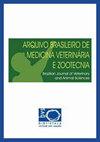Assessing transformation methods for group comparisons under violated assumptions: type I error rate and test power
IF 0.5
4区 农林科学
Q4 VETERINARY SCIENCES
Arquivo Brasileiro De Medicina Veterinaria E Zootecnia
Pub Date : 2023-10-01
DOI:10.1590/1678-4162-13026
引用次数: 0
Abstract
ABSTRACT In this study, some transformation methods that are applied when the assumptions of analysis of variance are not met are evaluated in terms of type I error rate and the test power, under circumstances with different distributions, number of groups, number of observations, variance ratios, and different standard deviation differences. The data set used in the study consisted of random numbers generated from N (0,1), and χ2(3) distributions using the random function of the Numpy library in the Python programming language. The logarithmic, square root and root transformations were evaluated on ANOVA based on simulation combinations. It was observed that the transformation techniques of taking the square root after adding 0.5 and 0.375 to the data were relatively more reliable compared to other transformations in terms of type I error rate. However, in every case, type I error rate determined at the beginning of the experiment increased both before and after the transformation was applied. In particular, interestingly, the third and fourth degree root transformations gave better results of test power in the right skewed distribution. In addition, we compared the transformation techniques in question to determine the normality of the data and the homogeneity of variances by a real data.在违反假设下评估群体比较的转换方法:第一类错误率和测试功率
本文对不满足方差分析假设条件下应用的几种变换方法,在不同分布、不同组数、不同观测数、不同方差比、不同标准差差的情况下,从ⅰ类错误率和检验能力两个方面进行了评价。研究中使用的数据集由使用Python编程语言Numpy库的随机函数从N(0,1)和χ2(3)分布生成的随机数组成。在模拟组合的基础上,对对数、平方根和根变换进行方差分析。我们观察到,就I类错误率而言,对数据加0.5和0.375后取平方根的变换技术相对于其他变换更为可靠。然而,在每种情况下,在实验开始时确定的I型错误率在应用变换之前和之后都有所增加。特别有趣的是,在右偏态分布中,三次和四次根变换给出了更好的测试功率结果。此外,我们比较了所讨论的转换技术,以确定数据的正态性和方差的均匀性。
本文章由计算机程序翻译,如有差异,请以英文原文为准。
求助全文
约1分钟内获得全文
求助全文
来源期刊
CiteScore
0.80
自引率
25.00%
发文量
111
审稿时长
9-18 weeks
期刊介绍:
Publica artigos originais de pesquisa sobre temas de medicina veterinária, zootecnia, tecnologia e inspeção de produtos de origem animal e áreas afins relacionadas com a produção animal. Atualmente a revista mantém 628 permutas (419 internacionais e 209 nacionais), sendo um verdadeiro suporte para o recebimento de periódicos pela Biblioteca da Escola.
A partir de 1999, a Escola de Veterinária delegou à FEP MVZ Editora o encargo do gerenciamento e edição de todas suas publicações, inclusive do Arquivo, ficando somente com o apoio logístico (instalações, equipamentos, pessoal etc.). O apoio financeiro é exercido pelo CNPq/FINEP e pela própria FEP MVZ.

 求助内容:
求助内容: 应助结果提醒方式:
应助结果提醒方式:


